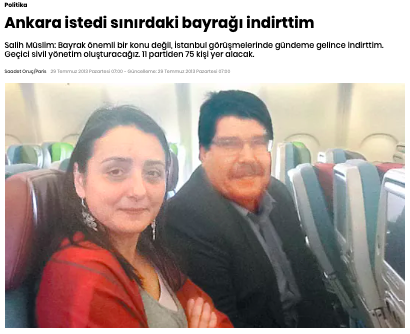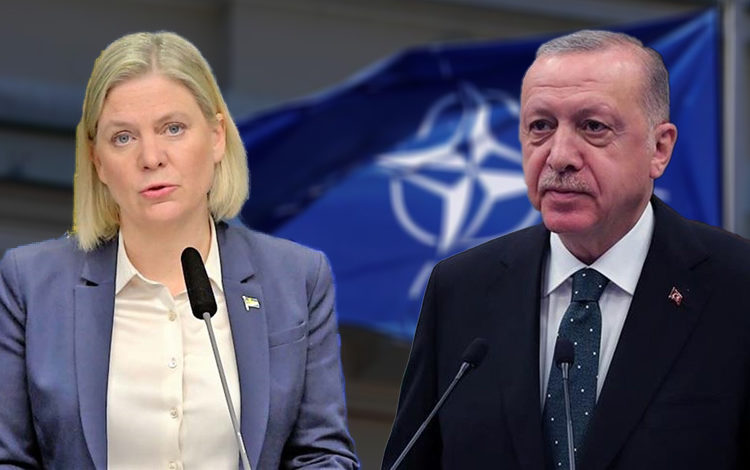Levent Kenez/Stockholm
Turkish President Recep Tayyip Erdoğan frequently says Sweden and Finland must meet Turkey’s demands to become members of NATO. Referring to Sweden in particular, Erdoğan states that Stockholm supports terrorists with whom Turkey is fighting. Ankara’s remarks and reactions since the candidacy of the two countries was announced are at odds with Turkey’s recent politics.
Answering reporters’ questions after meeting with Venezuelan President Nicolás Maduro in Ankara on Wednesday, Erdoğan said: “As long as interviews with terrorist leaders are broadcast on Swedish state television, we can’t say, ‘Come on, join NATO’.” Erdoğan had expressed this criticism before and said he was referring to Salih Muslim, the former leader of the Kurdish Democratic Union Party (PYD) in northern Syria.
However, Muslim was Turkey’s top interlocutor in the PYD between 2012 and 2015 and was officially invited to Ankara several times. Ahmet Davutoğlu, the then-Turkish minister of foreign affairs, stated that Turkey was pleased with Muslim’s remarks, which were in line with Turkey’s policy on the Syrian regime, adding “Like other opposition groups, Kurds need to establish a civilian administration in their own places where they are active.”
Speaking fluent Turkish, Muslim, a graduate of Istanbul Technical University who lived in Turkey for seven years, appeared on Turkish television many times and gave interviews to pro-government journalists. Saadet Oruç, who is currently an Erdoğan advisor, conducted one of these interviews for the Star newspaper, which is under the control of Erdoğan’s family.

When it comes to the speeches of terrorist leaders on state television, there is another incident that Erdoğan might have forgotten. Osman Öcalan — the brother of outlawed Kurdistan Workers’ Party (PKK) jailed leader Abdullah Öcalan — who was wanted by Turkey on a Red Notice, gave an interview to Turkish state television TRT before the local elections in 2019 and urged Kurdish voters not to select opposition candidate Ekrem İmamoğlu for mayor of Istanbul. In the same election period, PKK leader Öcalan’s call for Kurdish voters not to vote for İmamoğlu and to remain impartial was made public by the state-run Anadolu news agency.

Erdoğan criticizes Sweden for its relations with the Syrian Democratic Forces (SDF), which Turkey considers an affiliate of the PKK. Actually, the SDF opened its first representative office in Moscow in February 2016 under the name of the Autonomous Administration of North and East Syria (AANES), also known as the Rojava administration, a de facto autonomous region in northeastern Syria that is not officially recognized by any state.
In 2020 representatives of the Rojava administration and some Syrian Kurdish politicians were invited to Moscow and received a high-level reception by officials including Foreign Minister Sergei Lavrov. President Erdoğan has so far not publicly expressed dissatisfaction with Russia’s relations with the Syrian Kurds, whom Turkey considers “terrorists.”
In his statements on Wednesday, he also mentioned Amineh Kakabaveh, a Swedish lawmaker of Iranian descent, without naming her and described her as “the terrorist in the Swedish parliament.”
Erdoğan’s frequent targeting of the Swedish parliamentarian strengthens the negative perception of Turkey in Swedish public opinion even while Kakabayev is criticized in the Swedish media for taking the government hostage for her own agenda.
Moreover, in an interview with the Swedish state-run TT news agency on May 20, Turkish Ambassador to Sweden Hakkı Emre Yunt expressed Turkey’s discomfort with Kakabaveh’s activities. When the TT reporter asked if he wanted her to be extradited, he replied: “If possible, yes. But I don’t know, she must be a Swedish citizen? It’s difficult to deport their own citizens. But it’s up to the Swedish government.”
The ambassador’s remarks expressing a desire for the extradition of a Swedish lawmaker drew the ire of the Swedish media, meeting with contemptuous criticism. Upon the backlash, the embassy issued a statement saying that the ambassador did not specify anyone.
One of Erdoğan’s frequent blunders concerns the history of Turkey-NATO relations. When Erdoğan talks about the NATO membership of Sweden and Finland, he often harshly accuses past governments, stating that it was wrong to approve the return of Greece and France to NATO. However, he was the prime minister when France returned to NATO in 2009.
One of Turkey’s contradictions can be seen in the people whose extradition it is demanding. For instance, Bülent Keneş, a prominent journalist sought for extradition by Turkey, was the editor-in-chief of the Today’s Zaman daily, seized by the government in 2016. Erdoğan’s spokesperson İbrahim Kalın, who is conducting negotiations with Sweden, was a columnist for Today’s Zaman. In other words, Kalın wants the Swedish delegation to accept that the newspaper he was a columnist for was a terrorist publication.
Levent Kenez, another journalist whose extradition was requested, was the opinion editor of the then-best-selling Zaman newspaper during the years that Kalın and Erdoğan’s Communications Director Fahrettin Altun were frequent contributors.
In 2021 the Swedish Supreme Court rejected a request from Turkey for the extradition of Kenez, ruling that Turkey’s allegations against him did not contain a criminal element under Swedish law.
According to the Turkish press, another person whose extradition was requested was Harun Tokak, the former chairman of the Journalists and Writers Foundation. The foundation was represented in the wise men committee formed by the Erdoğan government in 2013 for a solution to the Kurdish issue.
One of the demands of the Erdoğan government is that the publication of Nordic Monitor be stopped by the Swedish state.
Turkish Foreign Minister Mevlüt Çavuşoğlu told Anadolu on May 31 that Sweden and Finland need to amend their counterterrorism laws, stressing that Turkey’s position will not change unless amendments are made.












